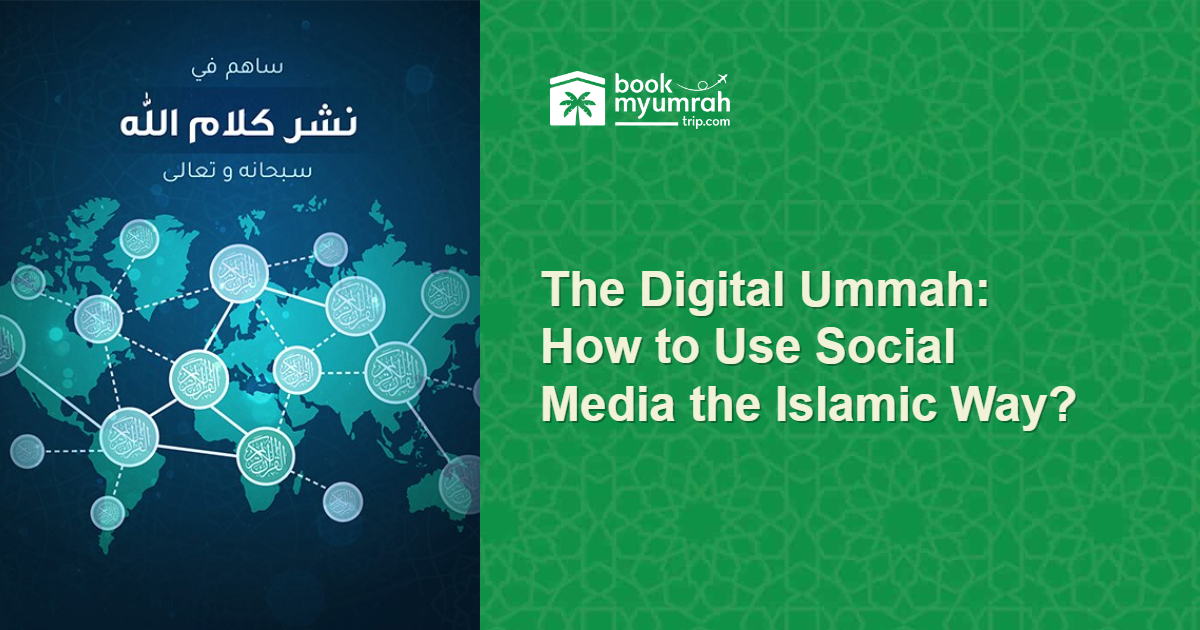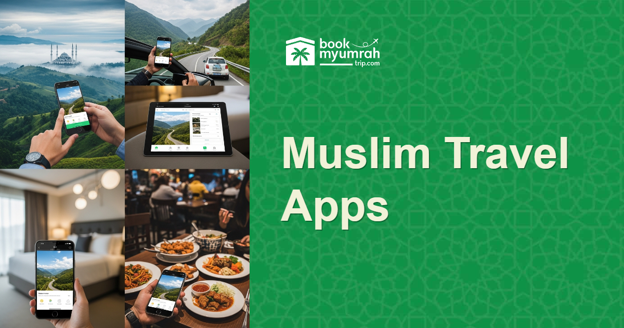The Digital Ummah: How to Use Social Media the Islamic Way?

Team BookMyUmrahTrip
Ummah today is not just physical; it is also digital. And Muslims have not been left behind in this digital transformation, and a question that comes up here is: “How do we use social media without losing our Islamic values?”
That’s just what we are going to answer in this piece for the young and digitally picked Muslims, covering the potential and traps of social media for the Ummah. It further draws guidance from the Quran and the Sunnah and provides practical steps to guide them in the digital sphere in a religious manner.
The Promise and Dangers of Social Media for Muslims
Social media provides Muslims with an opportunity to share knowledge, enhance brotherhood, and propagate the word of Islam beyond borders.
The Promise: A Way to Global Goodness
Dawah on a Mass Scale: Thousands can access a tweet, reel, or post. One study revealed that more than 2.6 million tweets contained the Quranic verses, and how Twitter is a modern source of spiritual reminders.
Addressing Negative Image: Muslims employed hashtags and posts to show that Islam gives the message of peace—a positive gesture of social media as an advocacy tool.
Community Building: Muslims all over the world can communicate in real time, create Quran study groups, or raise money to help the needy.
It is a real-world presentation of the Quran’s call: Invite to the way of your Lord with wisdom and good teaching. ~Qur'an 16:125
The Perils: Risks and Misuse
It has been surveyed that Instagram, Facebook, Twitter, TikTok, and YouTube, among other social media handles, have more than 5.42 billion users across the world. These platforms are defining how we interact, learn, and influence others. And like it's said: “Every light casts a shadow”, there are grave dangers of social media:
Misinformation: Tampered hadiths and fake quotes spread easily.
Ghibah & Slander: Gossiping behind screens is equally sinful as doing it face-to-face. Allah says: “Don’t backbite one another. Would you like to feed on the flesh of your dead brother? You would detest it." ~Qur'an 49:12
Vanity and Pride: Jealousy is a common result of Instagram lifestyles. Allah is not fond of the arrogant and boastful. ~Qur'an 4:36
Separatism and Fanaticism: Some pronounce others to be non-believers (takfir) with disastrous effects.
Wasting Time and Addiction: Worship and family time are consumed by hours of scrolling.
Hence, we need guidance to act in ways that increase good and lower harm.
Do the Quran and Hadith Give Word-Evidence?
Islam only has a saying when it's documented in holy texts.
1. Always Speak the Truth and Check Before You Share
The Qur'an commands:
"O you who believe, were a wicked man to reveal news, enquire, lest you destroy people with your ignorance. ~Quran 49:6
The Prophet ﷺ had also warned: It is false enough that a man should pass on all that he hears. ~Sahih Muslim
This renders fact-checking before posting a requirement.
2. Guard Your Tongue (and Thumbs!)
The Prophet ﷺ said: He who dies with the belief in Allah and the Last Day must speak good or remain silent. ~Bukhari & Muslim
Tweets, comments, and DMs shall be a part of our Speech in the digital age. Oftentimes, the best Islamic answer is silence.
3. Modesty and Privacy
Allah orders: "Tell the believing men and women to lower their gaze and guard their modesty.” ~Qur'an 24:30-31
This goes online: Do not put up immodest photos, add selfies, and excessively share personal information.
4. Will (Niyyah) and Strength
The Prophet said: Initiatives are determined by the intentions. (Bukhari).
It should be posted for Allah alone—not likes, popularity, or approval. Balance also matters; Islam encourages moderation, not obsession.
Direct Action: Social Media the Islamic Way
Before You Post
Ask: Why am I sharing this? (Check niyyah).
Check religious material (do not disseminate false hadith).
When you are not sure whether it is helpful, quit.
While Engaging
No insults, sarcasm, speak nicely.
Shun disputes; Qur’an says: “When the ignorant converse with them, they say, "Peace.” ~Quran 25:63
Do not feed trolls; answer with forbearance or silence.
Keep in mind: Each like and share holds you responsible on Judgment Day.
What to Share
Qur'an and hadith (authentic)
Community projects, Charity appeals
Personal musings and Islamic reminders
What to Avoid
Slander, gossip, and bringing out the shortcomings of other people
Show off posts about money or beauty
Contributing material to divisiveness, radicalization, or disrespect
Privacy and Time Management
Use privacy settings wisely.
Minimal usage of screen; no infinite scrolling.
Fast to spiritually cleanse.
Substitute wasted hours with Quran, dhikr, or family.
Difficulties Muslims Can Encounter Online
Extremism and Takfir: Others take advantage of platforms to call others disbelievers. This is a destructive habit, which is discouraged by scholars - it divides the Ummah.
Forgery and Misattribution (Fake Hadith): There are a lot of fake quotes that are falsely attributed to the Prophet ﷺ. Check with real sources before posting.
Comparison and Mental Health: The perception of others living a perfect life is something that generates envy or depression. Keep in mind: it is social media that glorifies. Islam preaches thanksgiving and satisfaction.
Stability: Internet vs Real World: Be the same both on and offline. Sincerity (ikhlas), rather than dual personalities, is valued in Islam.
Conclusion
Social media is a challenge and a trial. When employed judiciously, it becomes sadaqah jariyah, or a source of continuing reward. When it is abused, it is a source of sin.
It is up to us: will our posts, tweets, and reels be a source of light for the Ummah, or become a cause of its problems?
Takeaway Action Steps:
Stop and assess—niyyah, content, and benefit.
Set time constraints on social media.
Follow profiles that raise Iman, unfollow those that decrease it.
Pray to get a guide in all the digital steps.
May Allah (s.w.t.) guard our tongues and thumbs, make our posts useful, and reward them as good actions on the Resurrection Day. Amin!
FAQs
1. Can you share the Quran and Hadith on Instagram?
Yes, unless it is fake and is made disrespectfully. Never misquote or perform any ornamental edits so as to deceive the context.
2. What do I do when people attack Islam on the internet?
Act with wisdom or silence. Quran recommends: Qur’an says: “When the ignorant converse with them, they say, “Peace.” Get involved only when it's beneficial.
3. What should I do to quit the comparison of my life with other people on the Internet?
Restrict the exposure, unfollow people who cause envy, and turn shukr (gratitude) into a habit. Keep in mind: social media is filtered; real life is much different.


